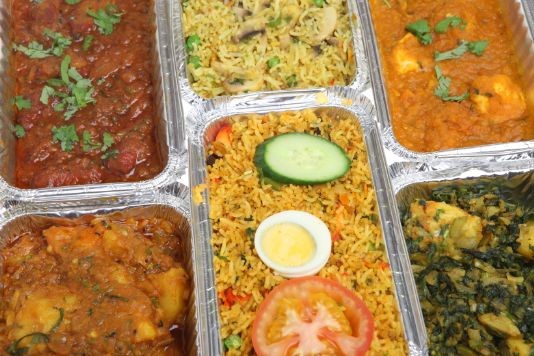Everyone loves an Indian takeaway. But when the foil cartons are piling up, do you start to worry how much it's costing you?
Enter Maunika Gowardhan: our resident Indian chef and curry expert, who knows how to keep a DIY curry cheap, healthy and quick. Here she shares her top tips…
Take a short cut
 “I do use cooking short cuts, and frankly curry pastes speed up the cooking process 10 times over,” says Maunika. When you’re pushed for time, she recommends using pastes such as those by Patak’s, most of which have 40 per cent less salt in now. Use their Tikka Masala Paste in spiced stuffed sea bass; their Balti Paste in homemade lamb koftas; or Madras Paste in a speedy chicken biryani.
“I do use cooking short cuts, and frankly curry pastes speed up the cooking process 10 times over,” says Maunika. When you’re pushed for time, she recommends using pastes such as those by Patak’s, most of which have 40 per cent less salt in now. Use their Tikka Masala Paste in spiced stuffed sea bass; their Balti Paste in homemade lamb koftas; or Madras Paste in a speedy chicken biryani.
Accessorise
“For me, the charm of an Indian restaurant is the elements they offer on the side. Poppadoms, pickles, lentil curries, raita… they all make for an amazing meal. But you can recreate the same feel at home, too.” Just whip up a simple curry recipe – like this nine-minute Keralan curry – and serve alongside piles of poppadoms, pickles, chutneys and a homemade raita, made only from yoghurt, cucumber, mint and a touch of chilli.
Choose cheap thighs
“When I’m doing cooking demos, the audience always assumes that you have to use chicken breast. But in fact chicken thighs are far more flavoursome, cheaper, and available skinless and boneless nowadays.” Valentine Warner is on the thigh side too – his chicken curry is made from off-the-bone thighs, marinated in a yoghurt masala mix and fried with potatoes and cardamom pods.
Slow-cooking in the morning
Maunika’s desert island kitchen toy would definitely be a slow cooker. “They’re a fantastic investment,” she says. “A basic model costs under £20 and beef and lamb are exquisite when slow-cooked. They’re very good for lentil and bean curries too, which only get better in taste when cooked long and slow.” Maunika’s top tip: put your curry on in the morning before leaving the house, and it’ll be ready and waiting for you after a hard day’s work.
Tins and roots
“Balance buying fresh ingredients with easy-to-hand things like root vegetables, which are cheaper and have a longer shelf life.” As well as her roots, Maunika always has a stash of chopped tomatoes in the cupboard. A great substitute for fresh tomatoes, recipes like this red quail curry depend on those tinned beauties, and it’s worth having tomato purée on hand too. Coconut milk is another must (both the full and low fat versions are readily available in supermarkets nowadays).
Do you make your own curries? And have you any tips to give us? Talk to us in the Comments Box below….
Slow cooker image courtesy of MECU
Also worth your attention:
Win a trip of a lifetime to India
Great recipes from Anjali Pathak
Recipes using Patak's pastes from Maunika Gowardhan

